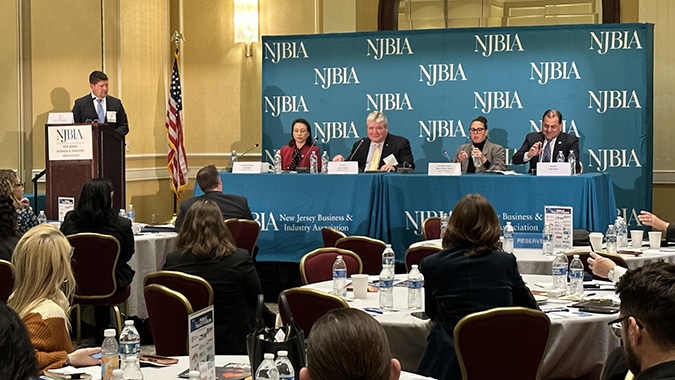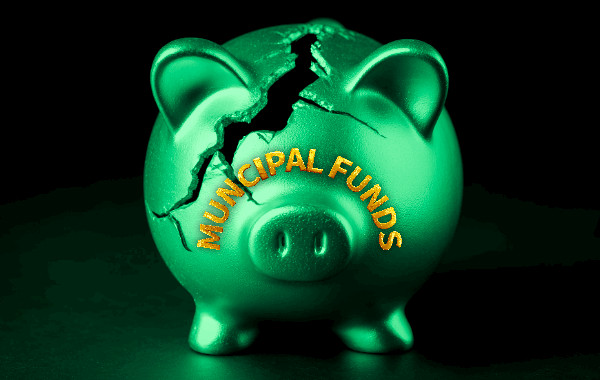Their answer is no.
Four key Democrats and Republicans on the state Senate and Assembly budget committees said Tuesday during NJBIA’s Public Policy Forum that they would not support extending the temporary corporate business tax surcharge beyond its scheduled sunset on Dec. 31.
The 2.5% temporary surcharge, which has been in place since 2018, is levied on top of the state’s regular 9% corporate business tax rate, giving New Jersey the highest business tax rate in the nation.
NJ101.5 News Director Eric Scott, who moderated the legislative panel discussion, asked the legislators who have key roles in drafting the state budget if their opposition to an extension of the 2.5% CBT surcharge could be swayed by the recent clamor from progressive groups that want the surtax made permanent and used as a dedicated funding source for NJ TRANSIT.
“I have ruled out using a CBT surcharge for NJ TRANSIT,” Senator Paul Sarlo (D-36), the chair of the Senate Budget & Appropriations Committee. “I did it last year, and I just did it again here today.”
Assembly Budget Committee Chair Eliana Pintor Marin (D-29), Assemblywoman Aura Dunn (R-25) and Senator Steve Oroho (R-24) all agreed that the CBT surcharge must sunset as scheduled and that other funding sources should be explored for NJ TRANSIT and property tax relief for seniors.
During his keynote speech earlier in the program, Gov. Phil Murphy also told the room of more than 240 businesspeople that he was committed to the sunset of the temporary CBT surcharge on Dec. 31.
Pintor Marin noted NJ TRANSIT’s financial situation is not unique and that mass transit agencies in other states are also struggling with structural budget deficits.
“I think we have to look at other options,” Pintor Marin said. “I don’t think that having corporations pay for it is really the way to go.”
Dunn, who also serves on the Assembly Budget Committee, agreed, pointing out that none of the nation’s mass transit agencies are money-making operations and NJ TRANSIT will never turn a profit.
“No, New Jersey does not need to have the highest (CBT) rate in order to support NJ TRANSIT,” Dunn said.
Oroho, a longtime member of the Senate Budget & Appropriations Committee who will retire from the Legislature in 2024, also agreed that a CBT surcharge should not fund NJ TRANSIT and offered an alternative that he said could bring in over $1 billion a year in revenue without raising taxes.
“We are missing the biggest revenue stream out there,” Oroho said, referring to the fact that New York continues to tax the incomes of people who work remotely from their New Jersey homes for New York companies even though these former New Jersey commuters no longer come into the city to work.
"It’s at least a billion-dollar revenue source that we’ve got to be more aggressive about because think of what we can do with that billion dollars,” Oroho said. “And there’s no tax increase involved in that whatsoever. In fact, some people will get a tax reduction.”
Sarlo said NJ TRANSIT would reach a “fiscal cliff” in FY 2025, the state budget year that begins on July 1, 2024. While NJ TRANSIT does need a dedicated funding source, he said there are other options that should be explored first, such as the state’s general fund revenues or possibly using the Transportation Trust Fund to partially “backfill” NJ Transit’s budget. Surcharges or new taxes imposed on businesses should be avoided at all costs, he said.
Scott asked if that meant Sarlo supported letting the current 2.5% CBT surcharge expire but would be open to a new surcharge in FY 2025 when NJ TRANSIT’s financial woes must be dealt with.
“Are you closing the door on a new CBT or a new business surcharge to fund NJ TRANSIT?” Scott asked Sarlo.
“I’m closing the door now, yeah,” Sarlo responded. “I don’t believe that a new CBT surcharge should be used to fund NJ TRANSIT.”




